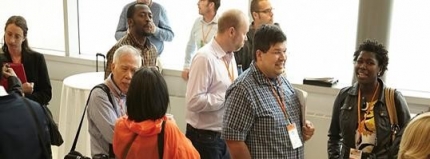Office of Science and Technology Policy Blog
US Ignite Fosters Technology for the Next Generation
Posted by on June 26, 2014 at 1:56 PM ESTBroadband access is essential to the Nation’s global competitiveness, helping to create new jobs, to accelerate technology innovation, and to expand global markets for American businesses. Broadband boosts the economy and enhances the public sector by providing improved tools to educators, doctors, and first responders in communities across the country.
US Ignite Application Summit 2013 (Credit: US Ignite)
Building on the Administration's efforts responding to the driving demand for gigabit broadband networks, in 2012 the White House Office of Science and Technology Policy and the National Science Foundation supported the launch of the US Ignite initiative, a private/public partnership that is fostering transformation of the public sector by accelerating the development and deployment of next-generation applications.
An independent 501(c)3 non-profit organization, US Ignite is working closely with its partners to create an ecosystem of 60 applications and 200 test beds for next-generation applications that will have a profound impact on how Americans work, live, learn, and play. These applications capitalize on the potential for gigabit broadband networks to improve education and workforce development, advanced manufacturing, health, transportation, public safety, and clean energy.
As the Chief Geek at Fitnet, a virtual fitness app, Bob Summers has developed and marketed consumer Internet applications since 1994. Fitnet is his fifth startup, and the first that uses gigabit Internet and computer vision technology to help users achieve health goals with mobile interactive fitness sessions. Summers developed iSpQ VideoChat, a desktop video conferencing software, to reach over 3.0 million users from 196 countries and territories, and continues to be passionate about creating compelling online video experiences.
I recently spoke with Bob about Fitnet and his work using next-generation technologies to transform the health of people across the country and around the world.
Learn more about TechnologyExecutive Actions to Accelerate Impact Investing to Create Jobs and Strengthen Communities
Posted by on June 25, 2014 at 7:49 AM ESTToday, at a White House roundtable on impact investing, senior Administration officials met with more than 20 private-sector investors answering the President’s call to action by announcing their new commitments to make more than $1.5 billion in investments that intentionally generate sound financial return as well as measurable social or environmental impact. New Administration actions will catalyze additional private sector impact investments and support these companies and entrepreneurs. Finally, according to a new private sector report released today, such smart policy interventions could help grow the global impact economy significantly.
President Obama has described this as an “all hands on deck” moment that requires all of us to pull together to create the change we seek. To tackle our most significant challenges, from combating childhood obesity to fighting climate change, from ensuring all hard-working Americans have the skills to get ahead to preparing American students for a 21st Century economy, to doubling access to power in sub-Saharan Africa, we need cross-sector collaboration fueled by a mix of improved regulation and public resources with private capital and philanthropic support. “Impact investing” stands out as one fast-growing model that brings together these strands. This model of investing to generate economic value as well as measurable environmental and social benefit is gaining traction across the country and around the world.
As part of today’s White House event, firms such as Prudential and the Capricorn Investment Group; foundations such as the McKnight, Ford, and MacArthur Foundations; and a wide range of family offices participated and discussed new impact investments.
Building on President Obama’s year of action using his pen and phone, the Administration will take a number of significant steps to encourage even more investors, foundations, businesses, and entrepreneurs to embrace this model. This includes announcements by SBA, USAID, and Treasury designed to facilitate the flow of private capital toward sustainable business models. These steps are just the latest in the Administration’s ongoing effort to support the growth of private sector led impact investing as a strategy to create jobs and strengthen communities in the U.S. as well as to advance the President’s global development goals.
Finally, the private sector U.S. National Advisory Board to the Social Impact Investment Task Force also released Private Capital, Public Good: How Smart Federal Policy Can Galvanize Impact Investing – and Why It’s Urgent. The Advisory Board, which participated in our White House event, includes a blue chip group of 27 leaders from across the investment, business, foundation, academic, and non-profit sectors.
For more information on all of these commitments, see the Background on the White House Roundtable on Impact Investing.
Byron Auguste is Deputy Assistant to the President and Deputy Director of the White House National Economic Council
Tom Kalil is the Deputy Director for Technology and Innovation at the White House Office of Science & Technology Policy
Jonathan Greenblatt is Special Assistant to the President and Director of the Office of Social Innovation and Civic Participation in the Domestic Policy Council
Learn more about Economy,Big Data, Open Data & the Federal Agencies
Posted by on June 24, 2014 at 3:40 PM ESTOpen data and big data -- and the responsible management and protection of that data -- are key components of the President’s agenda to drive innovation and economic growth.
On Thursday, June 19, leaders from civil society, industry, academia, and 40 Federal departments and agencies met at Georgetown University's McCourt School of Public Policy's Massive Data Institute to discuss how Federal agencies can continue to unlock government data to drive innovation and improve services. Drawing from the White House Working Group report, Big Data: Seizing Opportunities, Preserving Values, this event focused on opening and using government data, while appropriately protecting privacy and preventing the use of data to discriminate against vulnerable populations in our society.
Learn more about TechnologyWe the Geeks: SUBMERGED!
Posted by on June 23, 2014 at 12:13 PM ESTWhat better way dive into ocean science than to hear from an expert living 63 feet below the surface? To celebrate the end of National Oceans Month and one year of progress on President Obama’s Climate Action Plan, the White House and the Weather Channel will host “We the Geeks: SUBMERGED!” this Wednesday, June 25, at 2:00 p.m. ET.
Learn more about Energy and Environment, TechnologyThe Overwhelming Consensus of Climate Scientists Worldwide
Posted by on June 20, 2014 at 10:30 AM ESTOverwhelmingly, scientific evidence – including millions of measurements and observations of Earth from land, air, sea, and space – is telling us that:
- the global climate has been changing over the past several decades in a manner that is highly unusual compared to nature climatic variability;
- human emissions of greenhouse gases are the dominant cause of these unusual changes;
- these changes are already having significant adverse impacts on human wellbeing and on ecosystems; and
- that this harm will continue to grow unless and unless the offending emissions are greatly reduced.
The extremely rigorous and thorough 2013 and 2014 working group reports of the Intergovernmental Panel on Climate Change (IPCC), each developed by hundreds of scientists and technical experts from around the world, as well as the massive third U.S. national Climate Assessment, which was developed by more than 300 of the Nation’s top climate scientists and released by the Obama Administration last month, have further strengthened these fundamental scientific understandings.
I encourage anyone who questions whether there is widespread agreement among scientists about the reality and causes of climate change to read the selections provided below from these recent reports and earlier studies and statements by scientific leaders from around the world.
Learn more about Energy and EnvironmentFrom Lab Bench to Bedside: Accelerating the Commercialization of Biomedical Innovations
Posted by on June 19, 2014 at 2:37 PM ESTEd. Note: This article was originally posted on the NIH website.
We are delighted to announce a new collaboration between the National Institutes of Health (NIH) and the National Science Foundation (NSF) to empower entrepreneurial scientists and advance the Lab-to-Market priorities set forth in the President’s Management Agenda. The Federal government invests over $130 billion on research and development (R&D) each year, and the President’s 2015 budget supports a sustained commitment to accelerate the transfer of promising Federally-funded technologies from the laboratory to the commercial marketplace.
Some academic researchers and entrepreneurs who receive SBIR or STTR funding from NIH will now be eligible to participate in a pilot of the NSF Innovation Corps (I-Corps™) program that is specially tailored for biomedical technologies. First launched in 2011, the NSF I-Corps program is based on the “Lean Launchpad” curriculum developed by entrepreneurship expert Steve Blank to improve how tech start-ups bring their products into the marketplace. This intensive, mentor-driven experience is changing the way that NSF-funded researchers think about the commercialization process, and now it will be available for NIH-funded researchers as well.
As part of the I-Corps program, researchers learn key Lean Launchpad principles, such as:
- Commercializing a new invention requires the identification of a viable business model, not just an increase in the technological maturity of an invention.
- Discovering the elements of a successful business model (e.g. value proposition, customer segments, sources of revenue) requires gathering evidence to test and refine their initial hypotheses by talking to many different potential customers and partners—leaving the lab and “getting out of the building”.
- Developing prototypes and getting early feedback on these prototypes from customers can reduce the time and cost associated with the commercialization process.
- Gathering strong evidence that validates their business model can increase the likelihood that an investor will back their startup.
- &lsaquo previous
- …
- 29
- 30
- 31
- 32
- 33
- 34
- 35
- 36
- 37
- …
- next &rsaquo
White House Blogs
- The White House Blog
- Middle Class Task Force
- Council of Economic Advisers
- Council on Environmental Quality
- Council on Women and Girls
- Office of Intergovernmental Affairs
- Office of Management and Budget
- Office of Public Engagement
- Office of Science & Tech Policy
- Office of Urban Affairs
- Open Government
- Faith and Neighborhood Partnerships
- Social Innovation and Civic Participation
- US Trade Representative
- Office National Drug Control Policy
categories
- AIDS Policy
- Alaska
- Blueprint for an America Built to Last
- Budget
- Civil Rights
- Defense
- Disabilities
- Economy
- Education
- Energy and Environment
- Equal Pay
- Ethics
- Faith Based
- Fiscal Responsibility
- Foreign Policy
- Grab Bag
- Health Care
- Homeland Security
- Immigration
- Innovation Fellows
- Inside the White House
- Middle Class Security
- Open Government
- Poverty
- Rural
- Seniors and Social Security
- Service
- Social Innovation
- State of the Union
- Taxes
- Technology
- Urban Policy
- Veterans
- Violence Prevention
- White House Internships
- Women
- Working Families
- Additional Issues


